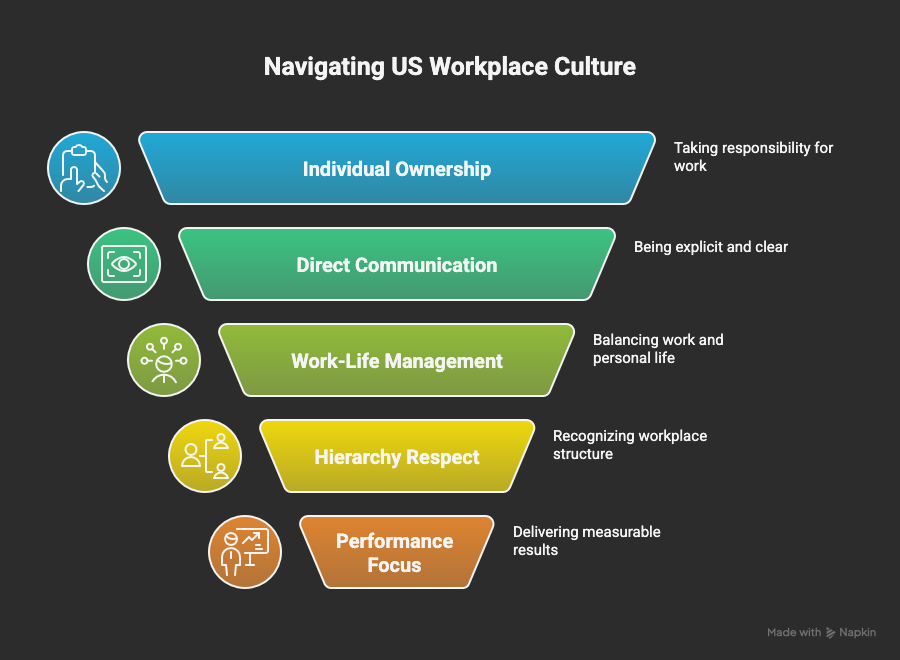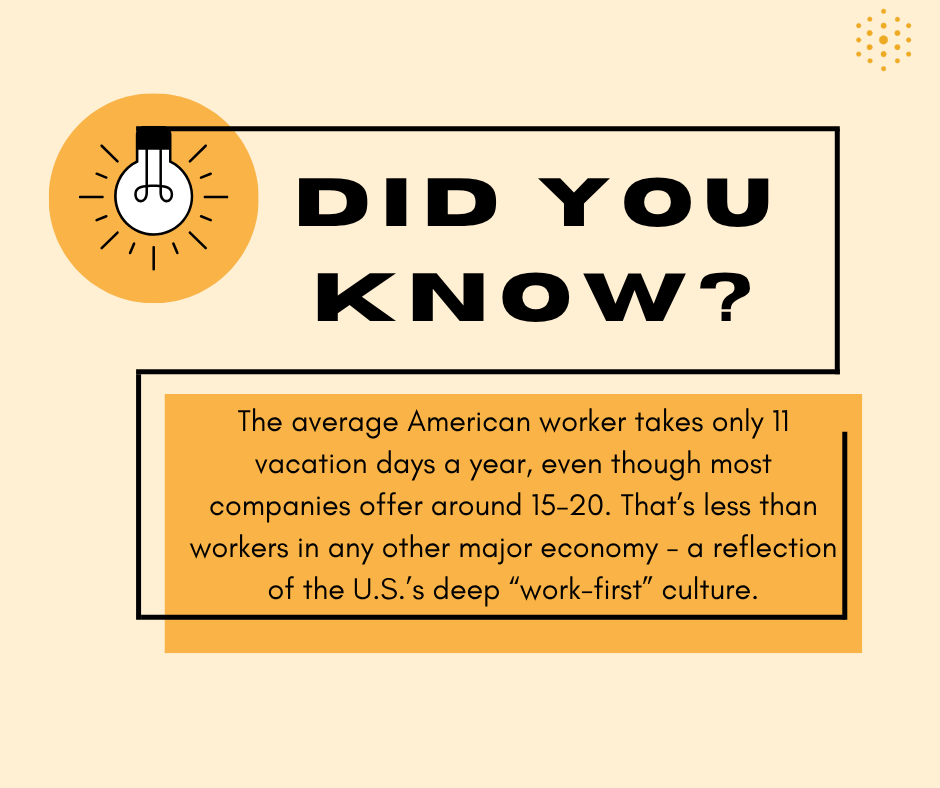What are the key principles for understanding U.S. workplace culture?
The U.S. workplace thrives on personal accountability, explicit communication, and measurable results. Success is defined by initiative and ownership, not hierarchy. Communication is low-context but feedback is often softened. Work-life balance depends on self-management, informality hides real hierarchy, and “at-will” employment drives performance pressure. Mastering these dynamics helps professionals adapt and excel in the American job market.
The U.S. workplace can feel familiar - friendly faces, first names, open doors, but don’t mistake the casual tone for simplicity.
Beneath the surface lies a culture wired for personal accountability, direct communication, and relentless results.
Here, “ownership” isn’t a buzzword, it’s survival. You’re expected to lead your own work, speak with clarity, and measure success in outcomes, not effort.
To succeed, you’ll need to read less between the lines and more into the results.
This guide unpacks the unspoken rules that power the American workplace and how to navigate them with confidence.
1. Individualism Means You "Own" Your Work
The most common advice is that Americans are "individualistic." What that actually means in the workplace is an extreme focus on personal accountability.
In many cultures, success is a collective "we" effort. In the US, success is championed by "I." This isn't seen as bragging; it's seen as taking ownership.
- The Data: The United States scores a 91 out of 100 on the Individualism dimension, one of the highest scores in the world, according to Hofstede Insights. This "I"-centric culture means you are personally responsible for your successes and your failures.
- Your Action Plan: Don't wait to be assigned tasks. You are expected to be a self-starter. When you complete a task, proactively report that it's done and ask what's next. When discussing your work, use "I" statements. "I analyzed the data and found..." is much stronger than "We looked at the data..." (if you did the work). This level of ownership is especially true in roles like project management, where you are the single point of contact for an outcome.
2. Communication is "Low-Context," but Feedback is Not
You've heard that communication is "direct," but the more useful term is "low-context."
- The Data: According to cultural expert Erin Meyer, author of The Culture Map, the US is the lowest-context culture in the world. A low-context culture is one where communication is explicit, clear, and simple. Messages are taken at face value. "Reading between the lines" is not a business skill.
- Your Action Plan: Be explicit. Put everything in writing. A verbal "yes" in a meeting should be followed up with an email summarizing the discussion and the next steps. This isn't about distrust; it's about clarity.
But here is the crucial exception: While general communication is direct, negative feedback is often indirect and softened. Americans are famous for the "feedback sandwich", like saying something positive, slipping in the criticism, and ending with another positive.
- Your Action Plan: You must learn to decode this. "Your presentation was great, but maybe we could look at the data source again" can often mean "Your data was wrong, and this is a serious issue." Always listen for the "but" or "however" that follows praise.

3. The "Work-Life Balance" Myth (Welcome to the "No-Vacation Nation")
This is perhaps the most important, non-obvious shock for newcomers. While many companies talk about work-life balance, the US culture and legal system are not built to support it.
- The Data 1: The United States is the only advanced economy in the world that does not have a federal law mandating paid vacation or holidays. This finding comes from a report by the Center for Economic and Policy Research (CEPR).
- The Data 2: The same applies to new parents. The US is one of only a handful of countries worldwide (and the only wealthy one) with no national paid parental leave, according to data from the OECD.
- Your Action Plan: In the US, work-life balance is considered your personal responsibility to manage, not the company's to provide. No one will tell you to stop working or to take your vacation. You must proactively schedule your time off and build boundaries for yourself.
4. Informality Hides a Strict Hierarchy
You'll walk in on your first day and be told to "call the CEO by his first name." The dress code may be jeans and a t-shirt. The office may have a ping-pong table.
Do not be fooled. This informality is a style, not a lack of structure.
The US workplace is informal, but it is not flat. The hierarchy is very real; it's just hidden. The boss is still the boss, and they have the final say.
- Your Action Plan: Respect the hierarchy through your performance, not through formal titles. You show respect by being prepared, meeting your deadlines, and not "wasting" your manager's time. A friendly, informal style is fine, but it never excuses poor results.
5. The Legal "Secret": At-Will Employment
This is the "why" behind the pressure, the focus on results, and the short-term mindset.
In 49 of the 50 states (Montana is the exception), employment is "at-will."
- The Data: "At-will" means an employer can terminate an employee at any time, for any reason (or no reason at all), as long as it's not for an illegal one (like discrimination). This is confirmed by the National Conference of State Legislatures (NCSL).
- Your Action Plan: This legal reality creates a culture of high performance and, at times, high pressure. Your job security is directly tied to the results you produce right now. This is why documenting your wins is so vital in the US job market - your performance is your protection. It also explains the "short-term orientation" that Hofstede's data found, where companies are hyper-focused on quarterly results.
Also Read: What are the state laws that govern your final paycheck in the US?

Your New Operating System
Navigating the US work culture is like learning a new operating system. It's not about being "fake"; it's about understanding the new rules.
The core drivers are accountability, explicit communication, and a relentless focus on measurable results.
Observe, ask questions, and focus on delivering clear, self-driven value. You'll adapt faster than you think.
And if you’re looking to tailor your career story for the U.S. market, Hiration can help.
Our AI-powered platform can help you refine your resume, cover letter, LinkedIn profile, and interview skills to match what American employers look for - clarity, ownership, and measurable results.
With the right support and mindset, every challenge becomes a chance to stand out and succeed.
Understanding U.S. Work Culture — FAQ
What does “individualism” mean in the U.S. workplace?
It means personal ownership of results. Employees are expected to take initiative, complete tasks independently, and communicate accomplishments using “I” statements rather than collective ones.
How should I communicate effectively at work in the U.S.?
Be clear, direct, and explicit—avoid assuming shared context. Always confirm conversations with written follow-ups. However, note that feedback may be softened; read carefully between positive phrases for the real message.
Is work-life balance really encouraged in the U.S.?
While companies promote it, there’s no federal law mandating paid vacation or parental leave. You’re responsible for setting personal boundaries and taking time off proactively—employers won’t do it for you.
Why does the U.S. workplace feel informal but still hierarchical?
Informality is cultural—first names and casual dress are common—but authority remains real. Managers expect accountability and performance. Respect is shown through results, not titles or formality.
What is “at-will” employment and why does it matter?
At-will employment allows employers or employees to end employment at any time for almost any reason. This legal setup fosters a results-driven culture where performance and reliability directly impact job security.
How can I build trust and credibility as a newcomer?
Deliver measurable outcomes early, communicate proactively, and keep commitments. In the U.S., consistency and follow-through are more valued than formality or deference to authority.
How can Hiration support professionals adapting to U.S. work culture?
Hiration helps you craft U.S.-standard resumes, cover letters, and LinkedIn profiles that highlight ownership, clarity, and measurable results—core traits that align with American workplace expectations.



